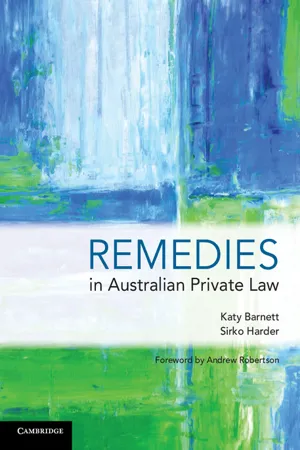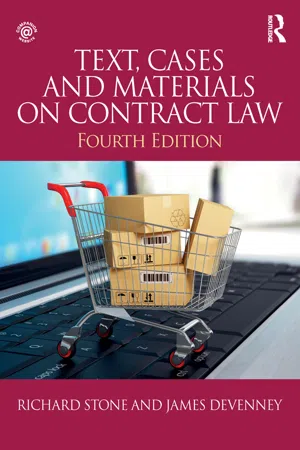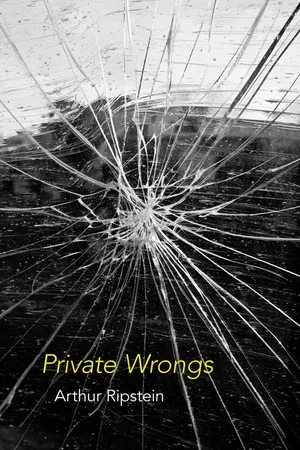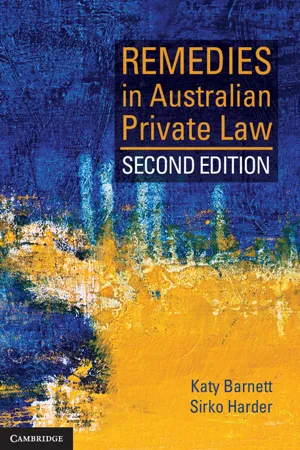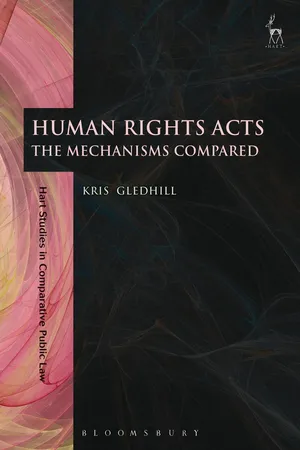Law
Law Remedy
A law remedy refers to the legal means by which a party seeks to enforce their rights or obtain compensation for a wrong suffered. It is a form of relief granted by a court to address a legal dispute or violation. Remedies can take various forms, such as monetary compensation, injunctions, specific performance, or declaratory judgments.
Written by Perlego with AI-assistance
Related key terms
1 of 5
6 Key excerpts on "Law Remedy"
- eBook - PDF
- Stuart Casey-Maslen(Author)
- 2014(Publication Date)
- Cambridge University Press(Publisher)
In such cases, courts determine a substitute remedy, often money, which seeks Megan Burke and Loren Persi-Vicentic 584 harm was caused. The second purpose of a remedy is to condemn the act that led to the violation and make it clear that there is a norm against such behav- iour. Third, and clearly leading on from the second, is the desire to deter future violations by essentially establishing a high ‘price’ for such behaviour. Finally, remedies should render justice by making the truth about human rights viola- tions known, acknowledging the suffering of the victims, reintegrating them, and encouraging a process of reconciliation and forgiveness. Such restorative justice is often seen to be most relevant in instances of large- scale rights abuses that affect entire communities or societies. 193 Regarding the use of weapons, it may be most applicable when there has been a large-scale, indiscriminate use of weapons during armed conflict or in pervasive violations of human rights by the security forces. The procedural aspect of remedying a rights violation requires victims to have the following: (a) equal and effective access to justice; (b) adequate, effective, and prompt reparation or redress for harm suffered; and (c) access to relevant information concerning violations and reparation mechanisms. 194 For a rights violation to be remedied effectively, reparations should be provided within a reasonable time. Victims who have been disabled as a result of the unlawful use of weapons are often dependent on compensation or rehabilita- tion awards to pay for medical care or physical rehabilitation. Family members of those who have died may also depend on the income of the victim to survive. Recognising the urgency of reparations for such victims, the United Nations Compensation Commission for Kuwait prioritised cases of individual vic- tims of the Iraqi invasion, including victims of landmines and other explosive devices, over those of businesses and states. - eBook - PDF
- Katy Barnett, Sirko Harder(Authors)
- 2014(Publication Date)
- Cambridge University Press(Publisher)
PART 4 REMEDIES AS VINDICATION 13 Self-help remedies I Introduction This chapter considers self-help remedies, which involve the plaintiff making good her own rights without the intervention of the judiciary. The focus of this book is on remedies that are awarded pursuant to a judicial order. However, an exclusive consid- eration of judicial remedies would ignore the fact that most disputes are settled outside the courts and that most parties prefer non-judicial settlements. It may be queried whether self-help remedies are really remedies in the strict sense of the word. They do not involve a court order; instead, the court gives permission to a plaintiff to act in a particular way. Nevertheless, in a broader sense, the plaintiff is given a means to redress her grievance by vindicating her own rights. When parties have a dispute, there can be several legal reactions (such as letters, discussions and telephone calls) before anything gets to court. Sometimes a party who believes she has been wronged will lodge a complaint with the other party, or threaten the other party’s reputation by complaining to others. 1 Alternative dispute resolution is another means by which parties may try to resolve a dispute without resorting to the courts. 2 However, the law lurks in the back- ground when parties try to settle disputes, and bargaining is conducted in the light of the relative legal positions. A clear entitlement to a legal remedy will put a party in a strong bargaining position. 3 Some actions done in an attempt to settle a dispute might have tortious or criminal consequences. Suppose that water repeatedly runs off my neighbour’s property and floods 1 D Harris, D Campbell and R Halson, Remedies in Contract and Tort (2nd edn, CUP 2005) 44–45. 2 S Colbran, P Spender, S Jackson, R Douglas and T Penovic, Civil Procedure: Commentary and Materials (5th edn, LexisNexis 2012) ch 3. 3 D Harris, D Campbell and R Halson, Remedies in Contract and Tort (2nd edn, CUP 2005) 44. 293 - eBook - PDF
- Richard Stone, James Devenney(Authors)
- 2017(Publication Date)
- Routledge(Publisher)
Chapter contents 15.1 Introduction 682 15.2 Damages 682 15.3 Specific relief 797 Additional reading 804 Chapter 15 Remedies REMEDIES 682 | 15.1 Introduction In this chapter we shall be considering remedies for breach of contract. In recent years there has been considerable debate about the meaning of the word ‘remedy’. Professor Birks famously argued that the word ‘remedy’ should be jettisoned from our legal dictionary because of its inherent ‘instability’ and its tendency to ‘impede’ the development of a classification of responses to private law actions (see, par-ticularly, Birks, P, ‘Rights, wrongs and remedies’ (2000) 20 OJLS 1, 3–4). This drastic course of action is probably not necessary. For example, Rafal Zakrzewski has provided us with a stable core meaning of remedy in his work Remedies Reclassified , 2005, Oxford: OUP. He suggests that we should ‘use the term “remedy” only in the sense of the rights arising from certain court orders or pronouncements’. We will consider the two main remedies for breach of contract in this chapter – the award of damages and, more briefly, the order of specific relief. Following a breach of contract, the courts generally aim to award a remedy that puts the claimant ‘in a situation as beneficial to him as if the agreement were specifically performed’ ( Harnett v Yielding (1805) 2 Sch & Lef 549, 553). Usually an award of compensatory damages will be sufficient to achieve this purpose because the claimant, for example, can use the damages to purchase substitute performance from an alternative source. In some situations, however, substitute performance will be unavailable or will be insufficient to pro-tect the claimant’s interest in performance of the contract. - eBook - PDF
- Arthur Ripstein(Author)
- 2016(Publication Date)
- Harvard University Press(Publisher)
I have argued that rights survive their own violation, and that remedies can be understood as the continuation of those rights. In earlier chap-ters I have said something about the way in which legal institutions are required to make the requirements determinate, and how they incorpo-rate social understandings and expectations in so doing. In this chapter I take up a different role for legal institutions: fashioning and ordering rem-edies. I explain this distinctive role in dialogue with a prominent objec-tion to the idea that rights survive their own violation, which has come to be associated with what is called “civil recourse.” Civil recourse theory has received its most prominent development in writings by John Gold-berg and Benjamin Zipursky, but Stephen Smith has also made signifi-cant contributions to its development. The core objection of civil recourse theorists to corrective justice theory has two interrelated elements: first, that the idea that rights survive their own violation cannot explain the essential role of the plaintiff in initiating a tort action; second, that it cannot explain why a remedy must be ordered by a court. Taken together, the elements are supposed to show that al-though a private wrong is the occasion of the court ordering a remedy, the basis of the remedy must be something other than the right. c h a p t e r 9 Remedies, Part 2 Before a Court 264 P r i vat e W ro n g s The core objection seldom travels alone; it is usually accompanied by ancillary arguments, many of which are supposed to buttress the central argument about the essential role of the court by showing that the idea that rights survive their own violation can explain at most a small subset of the wrongs and remedies addressed by the law of torts. - eBook - PDF
- Katy Barnett, Sirko Harder(Authors)
- 2018(Publication Date)
- Cambridge University Press(Publisher)
PART 4 REMEDIES AS VINDICATION 367 4 1 3 SELF-HELP REMEDIES 369 I Introduction [13:1] This chapter considers self-help remedies, which involve the plaintiff making good her own rights without the intervention of the judiciary. The focus of this book is on remedies that are awarded pursuant to a judicial order. However, an exclusive consideration of judicial remedies would ignore the fact that most disputes are settled outside the courts and that most parties prefer non-judicial settlements. It may be queried whether self-help remedies are really remedies in the strict sense of the word. They do not involve a court order; instead, the court gives permission to a plaintiff to act in a particular way. Nevertheless, in a broader sense, the plaintiff is allowed to redress her grievance by vindicating her own rights. By allowing a plaintiff to redress her rights in this way, the law affirms and reinforces the importance of certain interests. Varuhas has noticed that the interests protected by vindicatory awards are often associated with the torts actionable per se. 1 It will be seen in this chapter that self-help ‘remedies’ are indeed associated with responses to trespass to land, trespass to the person and wrongful interference with goods. Self-help remedies are also available for breach of contract, another cause of action actionable per se. [13:2] When parties have a dispute, there can be several legal reactions (such as letters, discussions, and telephone calls) before anything gets to court. Sometimes a party who believes she has been wronged will lodge a complaint with the other party, or threaten the other party’s reputation by complaining to others. 2 Alternative dispute resolution is another means by which parties may try to resolve a dispute without resorting to the courts. 3 However, the law lurks in the background when parties try to settle disputes, and bargaining is conducted in the light of the relative legal positions. - eBook - PDF
Human Rights Acts
The Mechanisms Compared
- Kris Gledhill(Author)
- 2015(Publication Date)
- Hart Publishing(Publisher)
The Privy Council determined that this permitted a new remedy (irre-spective of whether there was an existing one that could be raised), which would often be in the form of compensation as that would often be the only form of practicable remedy for a past breach. So there is clear jurisprudence that recently developed constitutional rem-edies are of some new form. But note in potential contrast the remedy provi-sions arising under the US Constitution, namely the implied cause of action arising directly under the Constitution (the Bivens remedy, noted in Chapter 9) and the statutory tort under USC 42, section 1983, noted above): the latter refers to the need for an action at law or in equity, and so it seems to be a normal action, typically tortious, involving a breach of constitutional rights, and the phrase constitutional torts is used as the general descriptor. Another question that has been raised is the purpose of any remedy, which might assist in determining the appropriate remedy to grant. The Canadian Supreme Court discussed this in Vancouver (City) v Alan Cameron Ward . 42 McLachlin CJ for the Court noted that the question of whether to award dam-ages was the subject of limited jurisprudence, but that appropriateness and just-ness of the remedy sought, damages, turned on the purpose of various potential remedies and so involved assessing their value in terms of providing compensa-tion for the breach, vindication of the right and deterrence of future breaches. She commented that damages were ‘a means well-recognized within our legal framework’ and ‘appropriate to the function and powers of a court’; and capable of being fair to the victim and the state. 43 But it was then necessary to consider whether there were countervailing factors, which might include the existence of an alternative remedy, including a private Law Remedy.
Index pages curate the most relevant extracts from our library of academic textbooks. They’ve been created using an in-house natural language model (NLM), each adding context and meaning to key research topics.

